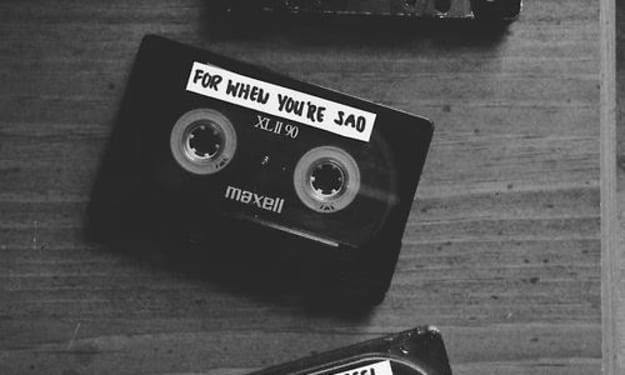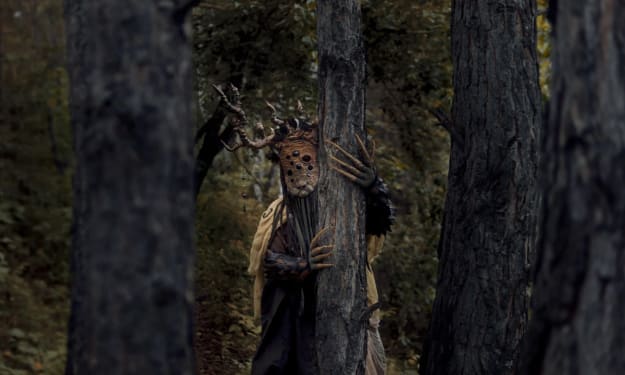Hush, Weep, and Whisper
every notebook has a secret

I’ve been locked in this drawer for decades.
Damp. Distressed. Disregarded.
It’s hard to say where the keys to the roll-top desk are, but W.W., whose initials remain emblazoned on the inside of my black cover, likely stuffed them in his pocket when he hung himself from the weeping willow in the grassy front yard. The tree remains visible from the rickety chair where he mocked my lined pages and wrote diagonally with fine-tipped pens when he awoke each morning.
I knew all of his secrets.
I was privy to his deepest, darkest thoughts until the very end.
He and I were the only ones who knew he was going to die.
He and I were the only ones who knew how.
I did not see his final moments, but he left the window ajar. I felt a slight breeze as his diseased body blew in the wind, hidden in the willow’s branches, his words and my pages shifting slightly through the gaping keyhole like a forgotten secret.
*
The eldest twin opens to page 82.
W.W., though he ignored the lines like an angry schoolboy, always neatly numbered the pages in the bottom right corner.
This house is a character. When I am gone, its bones and I will be the same. My breath will invade the warmest, coziest corners where I read Dostoevsky and Foucault and swore I would never leave. I meant it. Even after J. took off with my child, I refused to go. I will die here. Not in a hospital. Hospitals are too white, too sterile. I belong here. I saved for this house, for this life. Everything I own remains captured in these walls. The things I have enjoyed. The books I have read. The savings I have earned. The words I have written.
*
This place has some quirks, the realtor says, and I have heard this phrase sputtered through her dental veneers at least twelve times now. A whole lot of personality. She tries to shove the furniture to cover a stain on the floor, but we both know the desk won’t budge. After his death, W.W.’s estranged ex attempted to have the black walnut showpiece professionally moved to her new home in Lexington (with the new husband and old kid), but the most robust farmers in Eastern Kentucky couldn’t lift what remained of W.W.’s former life.
My pages won’t even flutter from years of neglect, but the medical records, still stacked perfunctorily in the drawer below me like a systematic secretary’s finest work, shift and scatter.
I wonder which will be found first.
I know, Mary Hushing says. I totally get it. Quirks are good. I’m quirky myself.
The rest of her family stands in silence as the floorboards murmur in agreement with Mrs. Hushing. She always gets what she wants, and this time will be no different.
*
Once the twins take the key from their brother, they find me easily.
The Hushing twins do everything together and never tire of one another or snooping around. Regular little Nancy Drews, I call them, though I know they wouldn’t know what I’m talking about.
Although the Hushing family does not pay for a landline, the remaining phones, so old-school, as the twins say, ring late at night on their own. When picked up at the same time in different rooms, the girls can speak to one another through the powder blue receivers. Befuddled these old contraptions work within the confines of the house, the twins, seniors this year, smile and create fake gossip, pretending they live in 1993. Did you hear about Joe Martin? He totally kissed Jessica the other day. Yeah, in the bathroom. Okay, see you at dinner!
They laugh, but the girls cease giggling when Myles, the younger brother, begins somnambulating down the stairs around 3 a.m. during their first winter in the house. He awakes halfway down the steps, his blanket wrapped around his bony ankles like an umbilical cord pulling him to his death.
Mr. Hushing wants to leave, but Mrs. Hushing will hear none of it. It’s my dream house, she says as her son wipes the nightmare from his cosmic blue eyes. I still don’t get how this is your dream home, but I love you, Mr. Hushing says as he carries their son back upstairs.
She’s obsessed with this place, the twins whisper to one another in their shared bedroom, where the door frequently cracks open in the middle of the night, especially during full moons, and then slowly shuts itself before either twin has the temerity to rise from the sheets and attempt to prove something, anything actually happened. It’s not suitable for anyone. This is all her fault. She had to live here. Wouldn’t even look at other places.
*
She flips quickly to page 112 and reads to her sister.
I wonder if J. would have left if she knew what was going on in my brain? Would it have been worth it to leave me then, to take my child? I emptied the money from the bank, every single dollar. The diagram shows where everything is, where I hid it. If she had paid attention to what was happening to me, if she would have stopped sleeping with that jerk long enough to notice how forgetful I was, the seizures, the paralysis of my left side, the mass growing as large as the moon in my frontal lobe…she might have stuck around. She could have had it all.
*
At 3:17 a.m., the twins hear a scratching sound on the wall separating them from Myles. They are too terrified to move, but they know they must protect their younger brother above all else.
He is young. Weak. Weary.
They find him sitting cross-legged on the floor with a rusting skeleton key in his hand.
The carvings in the wall look like perfectly formed mountains as the little boy frenetically digs into the wainscoting.
Those aren’t mountains, the younger twin says. Where did you find this key, Myles?
He doesn’t answer, so she shakes his shoulders like the branches of the weeping willow rattled when W.W. first hung from the tree. As if waking from a dream, Myles finally becomes responsive.
Under the grass, he says as he holds up his new treasure. I dug a hole.
*
The younger twin likes standing in front of her reflection and brushing her pale blonde hair. She tries to move the mirror from downstairs and up into the bedroom she shares with her sister, but the mirror won’t move. She stares into the reflection and looks through the window at the weeping willow in the front yard. What a beautiful, sad tree, she thinks as she pulls knots out of her hair as tangled as the willow’s roots. She opens the chest below the mirror and stores her hairbrush there.
Some secrets she doesn’t want to share.
*
Mrs. Hushing pretends to work on a thinly veiled novel about her dysfunctional life as a child. She spends hours locked in the old farmhouse's stuffy attic with her laptop and an old radio. Previously a doting, happy mother, she now forbids her children and husband from interrupting her work; though she once welcomed snacks and smiles from her kids as she wrote, she now ignores anyone who dares to creak up the mouthful of rotting stairs and inquire if she is hungry, thirsty, or lonely. There are no windows in the attic, and the cramped space is void of vocabulary and inspiration.
When he finally dares to check on his wife, Mr. Hushing finds her staring at an old red radio that hums nothing but static. Her computer screen, which he fears might be blank, frightens him more than the radio; there is nothing but the letter “w” on the screen, typed over and over again in lowercase, as if she glued her finger on the key and didn’t realize what happened for 127 pages.
Mr. Hushing opens his mouth to ask if she is okay, but it’s no use. She’s speaking to the static on the radio as if no one else is in the room but her. I’m back, she whispers as she grips the contraption, pale knuckled and raw. I always knew I’d come back.
*
Although the ink has slightly smeared over my pages, the girls have no trouble decoding the diagram. After all, W.W. had no intentions of being innovative.
He was dying. He was angry. He was bitter.
He was sick, the younger one says. There was something wrong with his brain. His wife left him when he was ill. He took matters into his own hands. Can’t say I blame him.
She shuffles the medical records, folds them, and stuffs them inside of me like sandwich meat.
We need to wait until everyone else is asleep, the oldest twin says. She always comes up with The Big Ideas. I haven’t known them long, but she is typically the one in charge. We’ll find the money, get Myles, and go.
Their father falls asleep quickly, but Mrs. Hushing never retreats from the attic; her day of writing continues in a never-ending loop. The girls wait for as long as they can and eventually decide it’s worth the risk.
Do we need another key? The older twin asks.
No, we just open the chest. According to the diagram, there’s a false bottom.
How do you know we can just open the chest?
The younger twin doesn’t answer but instead leads her sister to the trunk. She lifts the lid, tosses the hairbrush to the ground, and yanks out the false bottom. A cloud of dust causes the older twin to cough, and her sister swats her arm. Though they will be long gone, a film of dirt will soon coat the mirror and further obscure the view of where W.W. took his final breath.
Don’t wake Dad, or this will never work.
The cash is there, just as the diagram promised. For years, the legend was that W.W. hid the money somewhere on the farm, but it was in the house the whole time. The older twin stashes the money into a backpack and instructs her sister to collect Myles. Tell him I packed turkey-and-cheese. That’s his favorite.
There is $50,000 in the chest. No one counts the money, but nothing recorded in my pages has lied to them yet.
The last stack of bills has a tag: For Mary.
As she goes to retrieve her brother, the younger twin thinks of her mother in the attic, speaking nonsense to a stereo and typing the letter “w” nonstop. Was this the right thing to do? Their father, loyal to the death, would never abandon his wife. But they couldn’t live like this. This wasn’t fair to them and especially not Myles. He was already showing signs of possession and decline; he could not grow up here.
Once she returns with the boy, the three Hushing children scurry out the door completely unnoticed. There is a slight breeze; winter will blow away soon. The moon casts shadows of the weeping willow’s branches. The girls swear they see the words HUNG. DIE. SICK. formed by the sticks and illuminated by the moon. The wind blows again, softer this time, and the twigs change position while the twins get Myles into their used car and quietly leave the farm forever.
Mary Hushing stands in the attic like a specter; though there are no windows, she swears she can visualize her father swinging from the tree like a broken branch, see her children leaving her behind.
She tells no one, but I am stuffed into the younger twin’s hoodie pocket, my pages drier and ready for my next adventure.
Renewed. Ready. Revived.






Comments
There are no comments for this story
Be the first to respond and start the conversation.